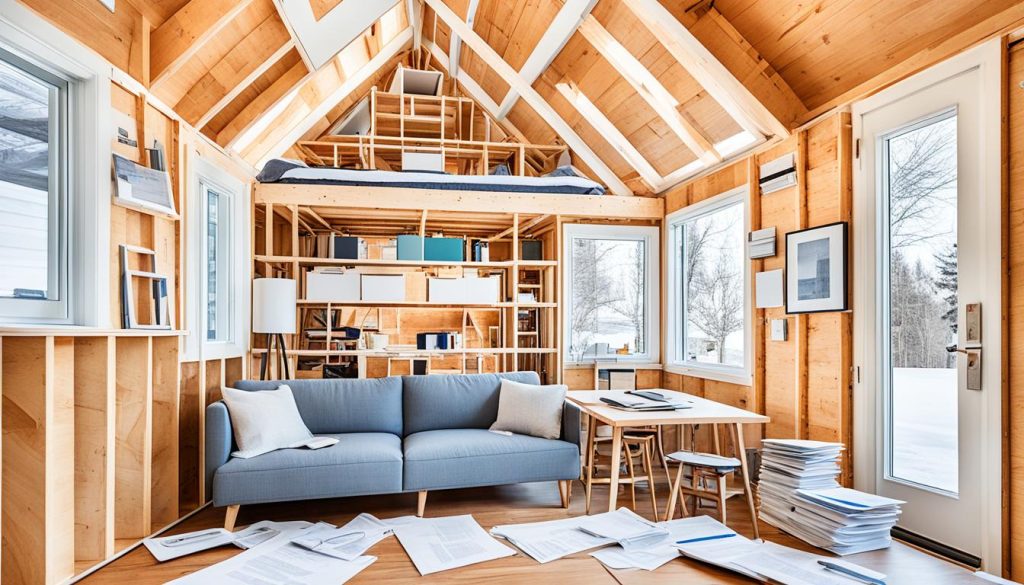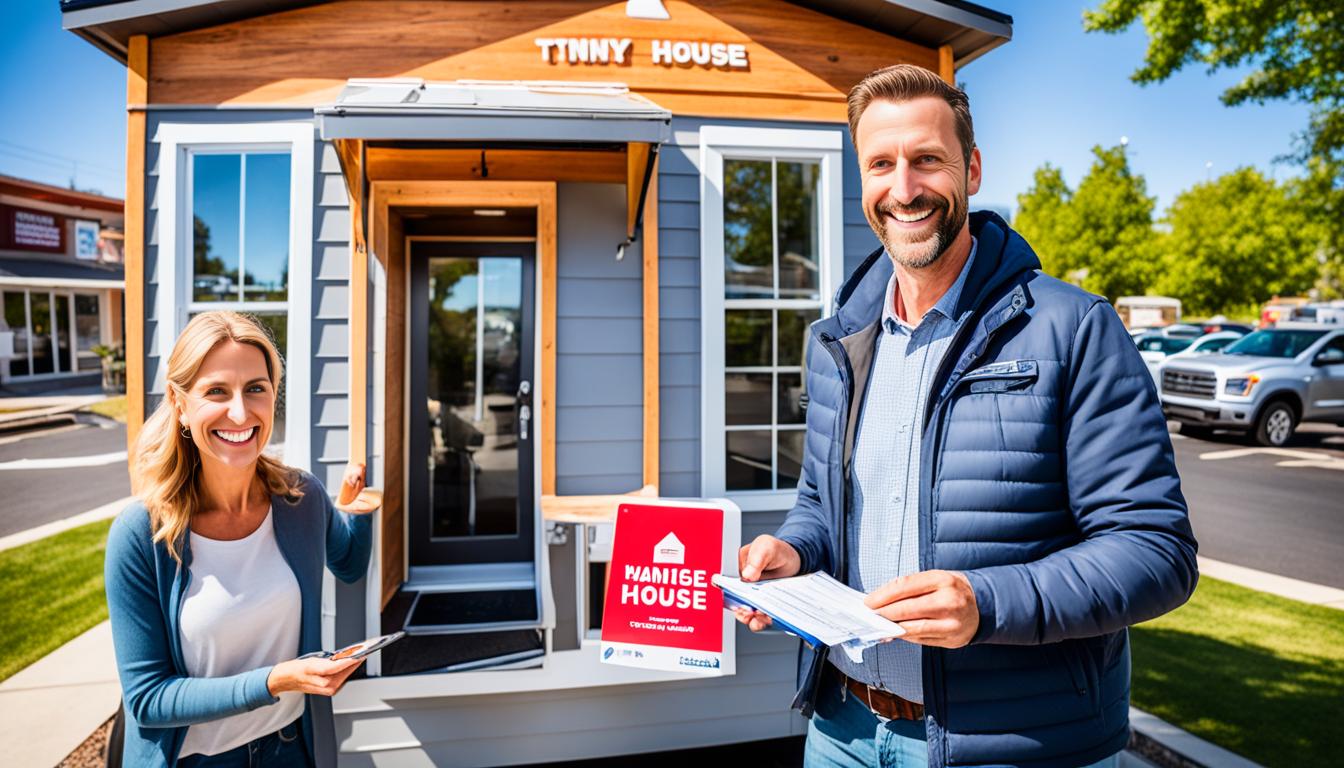Did you know that the popularity of tiny houses in Canada has been steadily increasing over the years? In fact, according to a recent survey, there are over 10,000 tiny houses across the country, and that number is expected to continue growing.
Financing a tiny house in Canada may seem like a daunting task, but with several options available, you can turn your compact living dreams into reality. Whether you are looking to buy a pre-built tiny house, build your own, or purchase land for your tiny home, there are financing options to consider.
In this article, I will explore seven common financing options for tiny houses in Canada, including unsecured personal loans, RV loans, personal lines of credit, chattel mortgages, builder-affiliated financing, home equity loans, and home equity lines of credit.
Key Takeaways:
- There are over 10,000 tiny houses in Canada.
- Financing options are available for buying, building, or purchasing land for a tiny house.
- The seven common financing options for tiny houses in Canada are unsecured personal loans, RV loans, personal lines of credit, chattel mortgages, builder-affiliated financing, home equity loans, and home equity lines of credit.
Unsecured Personal Loan
An unsecured personal loan is a flexible and popular option for financing a tiny house with a solid foundation or building your own RV-style tiny home. With an unsecured personal loan, you can receive a lump sum of money that you will repay over a few years, making it easier to fund your tiny house dreams.
One of the key advantages of an unsecured personal loan is the flexibility it offers in how the funds can be used. You can use the loan to purchase a tiny home outright from a builder or individual seller, or even buy a piece of land to build your own tiny home. This versatility allows you to tailor the loan to suit your specific needs and preferences.
However, it’s important to be aware that unsecured personal loans typically come with potentially high-interest rates, especially if you have less-than-stellar credit. Additionally, there may be additional charges such as origination fees and late fees, so it’s crucial to carefully review the loan terms and conditions.
Despite these considerations, an unsecured personal loan can be an excellent option for those seeking financing for their tiny house projects. It provides the financial freedom and the means to turn your tiny house aspirations into a reality.
Next, let’s explore another financing option for tiny houses in Canada.
RV Loans
Are you considering a tiny house on wheels? If so, you may be eligible for RV loans, which can provide the necessary financing for your dream home. RV loans are specifically designed to finance the purchase of recreational vehicles, including motor homes, travel trailers, toy haulers, and campers.
RV loans offer both secured and unsecured options, allowing you to choose the financing arrangement that works best for your situation. Secured loans may require collateral, such as the vehicle itself, while unsecured loans do not require any collateral.
One of the advantages of RV loans is the availability of long-term financing options. This allows you to spread out the repayments over an extended period, making it more manageable to budget for your tiny house.
However, it’s important to note that some lenders may require certification from the Canadian Recreational Vehicle Industry Association (CRVA) to ensure that the vehicle meets the necessary safety and quality standards.
It’s essential to consider the price range of RVs when exploring financing options. While there are models available to suit a variety of budgets, high-end luxury RVs may have limitations on the financing available.
RV Loan Comparison
| Lender | Interest Rate | Loan Term | Loan Amount |
|---|---|---|---|
| Lender A | 4.5% | 10 years | $50,000 |
| Lender B | 5.2% | 15 years | $75,000 |
| Lender C | 6.0% | 20 years | $100,000 |
As you can see from the comparison table above, different lenders offer varying interest rates, loan terms, and loan amounts for RV financing. It’s crucial to shop around and compare multiple options to ensure you find the best fit for your financial needs.
When considering RV loans for your tiny house financing, take the time to research and evaluate different lenders and loan options to determine what works best for you. By exploring the available financing options, you can make informed decisions and turn your tiny house dream into a reality.
Personal Line of Credit
If you are building your own tiny house, a personal line of credit can provide the flexibility of accessing funds as needed. Similar to a credit card, a personal line of credit gives you a predetermined credit limit that can be used for various expenses during the construction process. You only pay interest on the amount you withdraw, and the line of credit remains open as long as you make regular payments. However, it’s important to note that a personal line of credit may not cover the majority of your financing needs and may require additional sources of funding.
Chattel Mortgages
When it comes to financing your tiny house, traditional mortgages may not always be an option. However, there is an alternative solution – chattel mortgages. Chattel mortgages are loans specifically designed for movable personal property, similar to car loans. They are a popular choice for financing tiny homes placed on leased land or for those who frequently move their tiny houses.
One of the key advantages of chattel mortgages is that they often offer lower interest rates compared to personal loans. Additionally, they typically come with more flexible repayment terms, allowing you to tailor the loan to your financial situation.
While chattel mortgages can be a great financing option, it’s important to note that finding lenders that offer them might be more challenging compared to traditional mortgage lenders. However, by exploring different financing avenues and connecting with lenders specialized in chattel mortgages, you can secure the funds needed to turn your tiny house dreams into a reality.

| Factors | Traditional Mortgages | Chattel Mortgages |
|---|---|---|
| Eligible Property Types | Tied to real property (land and fixed structures) | Moveable personal property (e.g., tiny houses, RVs) |
| Interest Rates | Typically higher | Often lower |
| Repayment Terms | Longer terms available | Flexible and adjustable terms |
| Lender Availability | Wide range of lenders, traditional mortgage providers | Relatively fewer lenders specialized in chattel mortgages |
Builder-Affiliated Financing
When it comes to financing your tiny house, there’s an option that you may not have considered: builder-affiliated financing. Some tiny house builders have partnered with lenders to offer financing solutions specifically designed for their customers. This means that you can get expert advice and support from both the builder and the lender throughout the financing process. With builder-affiliated financing, you can enjoy competitive interest rates and loan terms that are similar to conventional home mortgages.
If you’re planning to build or purchase a tiny home from a specific builder, it’s worth exploring their builder-affiliated financing options. By working with a lender who understands the unique needs of tiny house buyers, you can find a financing solution that fits your budget and goals. However, it’s essential to carefully review the terms and interest rates of builder-affiliated financing to ensure that they align with your financial needs and objectives. As with any financing decision, it’s important to do your research and compare different options before making a commitment.

Builder-affiliated financing can provide a convenient and streamlined approach to financing your tiny house. By partnering with a builder and lender who have experience in the tiny house industry, you can navigate the financing process with confidence. Whether you’re looking to build a custom tiny home or purchase a pre-built model, builder-affiliated financing can help you turn your tiny house dreams into a reality.
Home Equity Loans
If you already own a home, you may have a valuable asset that can help you finance your tiny house. Home equity loans offer a solution to tap into the equity you’ve built up in your existing home and use it as collateral for a loan. With competitive interest rates and extended repayment terms, home equity loans provide an attractive option for funding your tiny home project.
By leveraging the equity in your home, you can secure a substantial loan amount to cover the cost of your tiny house, as well as additional expenses like repairs and upgrades. With long repayment terms, you can enjoy manageable monthly payments that fit within your budget.
However, it’s important to consider the potential risks associated with using your home equity as collateral. Defaulting on the loan could result in the loss of your primary residence, so it’s crucial to make timely payments and carefully assess your ability to meet the financial obligations.
If you’re considering a home equity loan for your tiny house financing, consult with a reputable lender to explore your options and ensure you make an informed decision that aligns with your financial goals.
| Pros | Cons |
|---|---|
| Low interest rates | Risk of losing your primary home if you default on the loan |
| Extended repayment terms | Requires existing homeownership |
| Flexible usage of funds | Additional costs such as appraisal and closing fees |
Home Equity Lines of Credit
When it comes to financing your tiny house, home equity lines of credit (HELOCs) can be a valuable option for Canadian homeowners. With a HELOC, you have the flexibility to access funds using your home equity as collateral.
A HELOC works like an open-ended account that allows you ongoing access to cash as needed. This can be especially helpful when financing your tiny house project, as it gives you the freedom to withdraw funds as required for construction, materials, and other expenses.
One of the main advantages of a HELOC is the lower interest rates compared to other forms of credit. This can significantly reduce the cost of financing your tiny house, saving you money in the long run.
However, it’s important to understand that HELOCs come with variable interest rates, which means they can fluctuate over time. Be sure to carefully review the terms and conditions of your HELOC agreement to ensure you are comfortable with the potential rate changes.
Additionally, it’s crucial to consider the risk involved in using your home equity as collateral. If you fail to make payments on your HELOC, you could potentially lose your primary home. Make sure to assess your financial situation and determine if a HELOC is the right choice for you.

Leave a Reply
You must be logged in to post a comment.